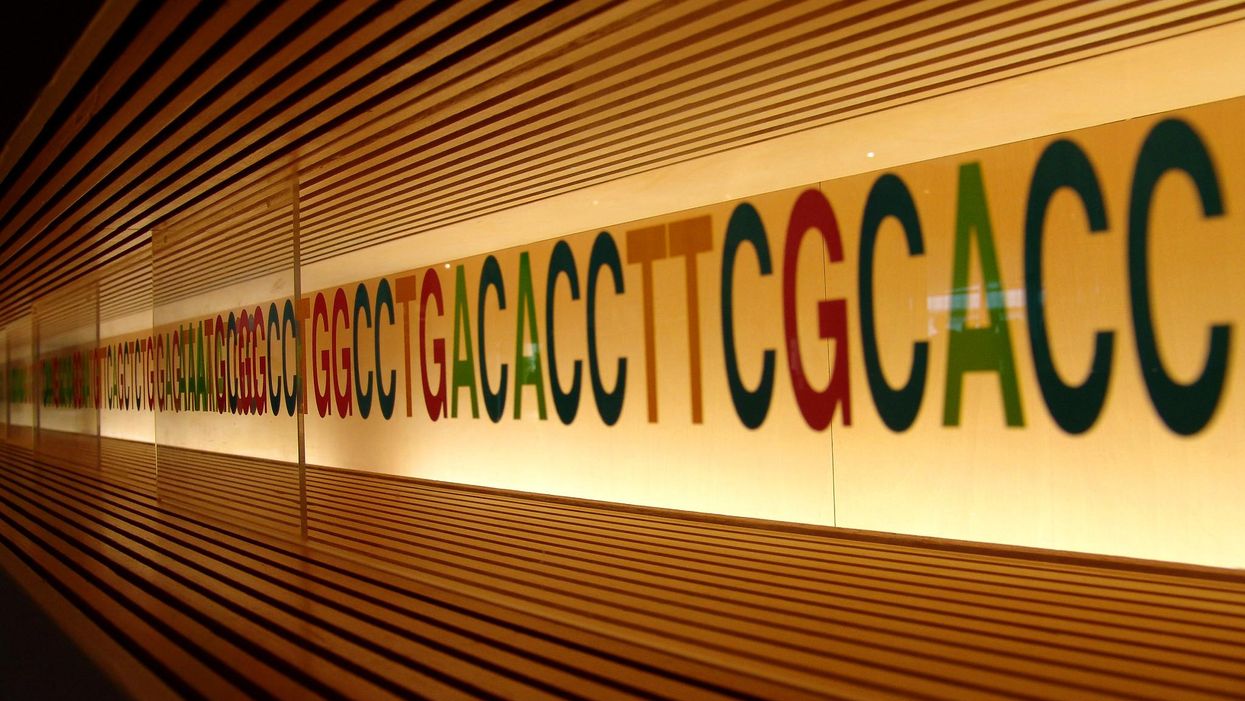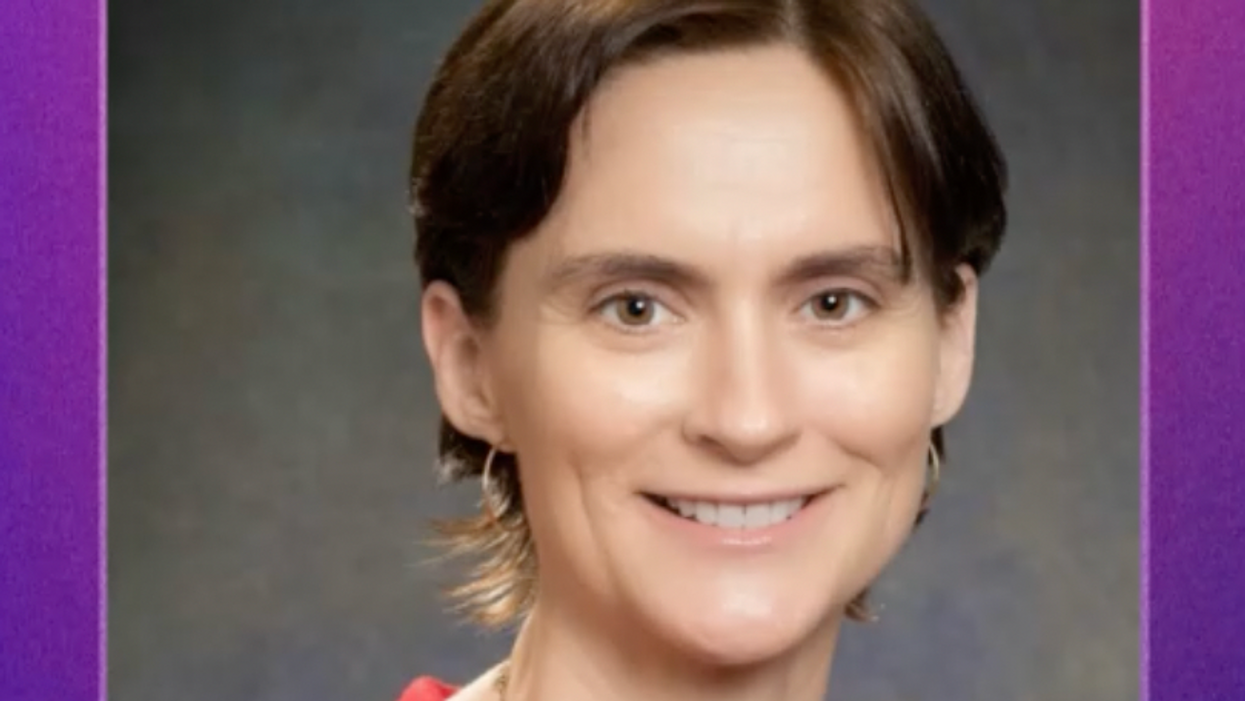After his grandmother’s dementia diagnosis, one man invented a snack to keep her healthy and hydrated.

Founder Lewis Hornby and his grandmother Pat, sampling Jelly Drops—an edible gummy containing water and life-saving electrolytes.
On a visit to his grandmother’s nursing home in 2016, college student Lewis Hornby made a shocking discovery: Dehydration is a common (and dangerous) problem among seniors—especially those that are diagnosed with dementia.
Hornby’s grandmother, Pat, had always had difficulty keeping up her water intake as she got older, a common issue with seniors. As we age, our body composition changes, and we naturally hold less water than younger adults or children, so it’s easier to become dehydrated quickly if those fluids aren’t replenished. What’s more, our thirst signals diminish naturally as we age as well—meaning our body is not as good as it once was in letting us know that we need to rehydrate. This often creates a perfect storm that commonly leads to dehydration. In Pat’s case, her dehydration was so severe she nearly died.
When Lewis Hornby visited his grandmother at her nursing home afterward, he learned that dehydration especially affects people with dementia, as they often don’t feel thirst cues at all, or may not recognize how to use cups correctly. But while dementia patients often don’t remember to drink water, it seemed to Hornby that they had less problem remembering to eat, particularly candy.

Hornby wanted to create a solution for elderly people who struggled keeping their fluid intake up. He spent the next eighteen months researching and designing a solution and securing funding for his project. In 2019, Hornby won a sizable grant from the Alzheimer’s Society, a UK-based care and research charity for people with dementia and their caregivers. Together, through the charity’s Accelerator Program, they created a bite-sized, sugar-free, edible jelly drop that looked and tasted like candy. The candy, called Jelly Drops, contained 95% water and electrolytes—important minerals that are often lost during dehydration. The final product launched in 2020—and was an immediate success. The drops were able to provide extra hydration to the elderly, as well as help keep dementia patients safe, since dehydration commonly leads to confusion, hospitalization, and sometimes even death.
Not only did Jelly Drops quickly become a favorite snack among dementia patients in the UK, but they were able to provide an additional boost of hydration to hospital workers during the pandemic. In NHS coronavirus hospital wards, patients infected with the virus were regularly given Jelly Drops to keep their fluid levels normal—and staff members snacked on them as well, since long shifts and personal protective equipment (PPE) they were required to wear often left them feeling parched.
In April 2022, Jelly Drops launched in the United States. The company continues to donate 1% of its profits to help fund Alzheimer’s research.
6 Biotech Breakthroughs of 2021 That Missed the Attention They Deserved
A string of the code that comprises a DNA molecule, pictured at Miraikan, the National Museum of Emerging Science and Innovation in Japan.
News about COVID-19 continues to relentlessly dominate as Omicron surges around the globe. Yet somehow, during the pandemic’s exhausting twists and turns, progress in other areas of health and biotech has marched on.
In some cases, these innovations have occurred despite a broad reallocation of resources to address the COVID crisis. For other breakthroughs, COVID served as the forcing function, pushing scientists and medical providers to rethink key aspects of healthcare, including how cancer, Alzheimer’s and other diseases are studied, diagnosed and treated. Regardless of why they happened, many of these advances didn’t make the headlines of major media outlets, even when they represented turning points in overcoming our toughest health challenges.
If it bleeds, it leads—and many disturbing stories, such as COVID surges, deserve top billing. Too often, though, mainstream media’s parallel strategy seems to be: if it innovates, it fades to the background. But our breakthroughs are just as critical to understanding the state of the world as our setbacks. I asked six pragmatic yet forward-thinking experts on health and biotech for their perspectives on the most important, but under-appreciated, breakthrough of 2021.
Their descriptions, below, were lightly edited by Leaps.org for style and format.
New Alzheimer's Therapies

Mary Carrillo, Chief Science Officer at the Alzheimer’s Association
Alzheimer's Association
One of the biggest health stories of 2021 was the FDA’s accelerated approval of aducanumab, the first drug that treats the underlying biology of Alzheimer’s, not just the symptoms. But, Alzheimer’s is a complex disease and will likely need multiple treatment strategies that target various aspects of the disease. It’s been exciting to see many of these types of therapies advance in 2021.
Following the FDA action in June, we saw renewed excitement in this class of disease-modifying drugs that target beta-amyloid, a protein that accumulates in the brain and leads to brain cell death. This class includes drugs from Eli Lilly (donanemab), Eisai (lecanemab) and Roche (gantenerumab), all of which received Breakthrough Designation by the FDA in 2021, advancing the drugs more quickly through the approval process.
We’ve also seen treatments advance that target other hallmarks of Alzheimer’s this year. We heard topline results from a phase 2 trial of semorinemab, a drug that targets tau tangles, a toxic protein that destroys neurons in the Alzheimer’s brain. Plus, strategies targeting neuroinflammation, protecting brain cells, and reducing vascular contributions to dementia – all funded through the Alzheimer's Association Part the Cloud program – advanced into clinical trials.
The future of Alzheimer’s treatment will likely be combination therapy, including drug therapies and healthy lifestyle changes, similar to how we treat heart disease. Washington University announced they will be testing a combination of both anti-amyloid and anti-tau drugs in a first-of-its-kind clinical trial, with funding from the Alzheimer’s Association.
AlphaFold

Olivier Elemento, Director of the Caryl and Israel Englander Institute for Precision Medicine at Cornell University
Cornell University
AlphaFold is an artificial intelligence system designed by Google’s DeepMind that opens the door to understanding the three-dimensional structures and functions of proteins, the building blocks that make up almost half of our bodies' dry weight. In 2021, Google made AlphaFold available for free and since then, researchers have used it to drive greater understanding of how proteins interact. This is a foundational event in the field of biotech.
It’s going to take time for the benefits from AlphaFold to transpire, but once we know the 3-D structures of proteins that cause various diseases, it will be much easier to design new drugs that can bind to these proteins and change their activity. Prior to AlphaFold, scientists had identified the 3-D structure of just 17 percent of about 20,000 proteins in the body, partly because mapping the structures was extremely difficult and expensive. Thanks to AlphaFold, we’ve now jumped to knowing – with at least some degree of certainty – the protein structures of 98.5 percent of the proteome.
For example, kinases are a class of proteins that modify other proteins and are often aberrantly active in cancer due to DNA mutations. Some of the earliest targeted therapies for cancer were ones that block kinases but, before AlphaFold, we had only a premature understanding of a few hundred kinases. We can now determine the structures of all 1,500 kinases. This opens up a universe of drug targets we didn’t have before.
Additional progress has been made this year toward potentially using AlphaFold to develop blockers of certain protein receptors that contribute to psychiatric illnesses and other neurological diseases. And in July, scientists used AlphaFold to map the dimensions of a bacterial protein that may be key to countering antibiotic resistance. Another discovery in May could be essential to finding treatments for COVID-19. Ongoing research is using AlphaFold principles to create entirely new proteins from scratch that could have therapeutic uses. The AlphaFold revolution is just beginning.
Virtual First Care

Jennifer Goldsack, CEO of Digital Medicine Society
Digital Medicine Society
Imagine a new paradigm of healthcare defined by how good we are at keeping people healthy and out of the clinic, not how good we are at offering services to a sick person at the clinic. That is the promise of virtual-first care, or V1C, what I consider to be the greatest, and most underappreciated, advance that occurred in medicine this year.
V1C is defined as medical care accessed through digital interactions where possible, guided by a clinician, and integrated into a person’s everyday life. This type of care includes spit kits mailed for laboratory tests and replacing in-person exams with biometric sensors. It’s built around the patient, not the clinic, and provides us with the opportunity to fundamentally reimagine what good healthcare looks like.
V1C flew under the radar in 2021, eclipsed by the ongoing debate about the value of telehealth more broadly as we emerge from the pandemic. However, the growth in the number of specialty and primary care virtual-first providers has been matched only by the number of national health plans offering virtual-first plans. Our own virtual-first community, IMPACT, has tripled in size, mirroring the rapid growth of the field driven by patient demand for care on their terms.
V1C differs from the ‘bolt on’ approach of video visits as an add-on to traditional visit-based, episodic care. V1C takes a much more holistic approach; it allows individuals to initiate care at any time in any place, recognizing that healthcare needs extend beyond 9-5. It matches the care setting with each individual’s clinical needs and personal preferences, advancing a thorough, evidence-based, safe practice while protecting privacy and recognizing that patients’ expectations have changed following the pandemic. V1C puts the promise of digital health into practice. This is the blueprint for what good healthcare looks like in the digital era.
Digital Clinical Trials

Craig Lipset, Founder of Clinical Innovation Partners and former Head of Clinical Innovation at Pfizer
Craig Lipset
In 2021, a number of digital- and data-enabled approaches have sustained decentralized clinical trials around the world for many different disease types. Pharma companies and clinical researchers are enthusiastic about this development for good reason. Throughout the pandemic, these decentralized trials have allowed patients to continue in studies with a reduced need for site visits, without compromising their safety or data quality.
Risk-based monitoring was deployed using data and thoughtful algorithms to identify quality and safety issues without relying entirely on human monitors visiting research sites. Some trials used digital measures to ensure high quality data on target health outcomes that could be captured in ways that made the participants’ physical location irrelevant. More than three-quarters of research organizations, such as pharma and biotech, have accelerated their decentralized clinical trial strategies. Before COVID-19, 72 percent of trial sites “rarely or never” used telemedicine for trial participants; during COVID, 64 percent “sometimes, often or always” do.
While the research community does appreciate the tremendous hope and promise brought by these innovations, perhaps what has been under-appreciated is the culture shift toward thoughtful risk-taking and a willingness to embrace and adopt clinical trial innovations. These solutions existed before COVID, but the pandemic shifted the perception of risks versus benefits involved in these trials. If there is one breakthrough that is perhaps under-appreciated in life sciences clinical research today, it’s the power of this new culture of willingness and receptivity to outlast the pandemic. Perhaps the greatest loss to the research ecosystem would be if we lose the momentum with recent trial innovations and must wait for another global pandemic in order to see it again.
Designing Biology

Sudip Parikh, CEO of the American Association for the Advancement of Science and Executive Publisher of the Science family of journals
American Association for the Advancement of Science
As our understanding of basic biology has grown, we are fast approaching an era where it will be possible to design and direct biological machinery to create treatments, medicine, and materials. 2021 saw many breakthroughs in this area, three of which are listed below.
The understanding of the human microbiome is growing as is our ability to modify it. One example is the movement toward the notion of the “bug as the drug.” In June, scientists at the Brigham and Women’s Hospital published a paper showing that they had genetically engineered yeast – using CRISPR/Cas9 – to sense and treat inflammation in the body to relieve symptoms of irritable bowel syndrome in mice. This approach could potentially be used to address issues with your microbiome to treat other chronic conditions.
Another way in which we saw the application of basic biology discoveries to real world problems in 2021 is through groundbreaking research on synthetic biology. Several institutions and companies are pursuing this path. Ginkgo Bioworks, valued at $15 billion, already claims to engineer cells with assembly-line efficiency. Imagine the possibilities of programming cells and tissue to perform chemistry for the manufacturing process, inspired by the way your body does chemistry. That could mean cleaner, more controllable, and affordable ways to manufacture food, therapeutics, and other materials in a factory-like setting.
A final example: consider the possibility of leveraging the mechanics of your own body to deliver proteins as treatments, vaccines, and more. In 2021, several scientists accelerated research to apply the mRNA technology underlying COVID-19 vaccines to make and replace proteins that, when they’re missing or don’t work, cause rare conditions such as cystic fibrosis and multiple sclerosis.
These applications of basic biology to solve real world problems are exciting on their own, but their convergence with incredible advances in computing, materials, and drug delivery hold the promise of game-changing progress in health care and beyond.
Brain Biomarkers

David R. Walt, Professor of Biologically Inspired Engineering, Harvard Medical School, Brigham and Women’s Hospital, Wyss Institute at Harvard University
David Walt
2021 brought the first real hope for identifying biomarkers that can predict neurodegenerative disease. Multiple biomarkers (which are measurable indicators of the presence or severity of disease) were identified that can diagnose disease and that correlate with disease progression. Some of these biomarkers were detected in cerebrospinal fluid (CSF) but others were measured directly in blood by examining precursors of protein fibers.
The blood-brain barrier prevents many biomolecules from both exiting and entering the brain, so it has been a longstanding challenge to detect and identify biomarkers that signal changes in brain chemistry due to neurodegenerative disease. With the advent of omics-based approaches (an emerging field that encompasses genomics, epigenomics, transcriptomics, proteomics, and metabolomics), coupled with new ultrasensitive analytical methods, researchers are beginning to identify informative brain biomarkers. Such biomarkers portend our ability to detect earlier stages of disease when therapeutic intervention could be effective at halting progression.
In addition, these biomarkers should enable drug developers to monitor the efficacy of candidate drugs in the blood of participants enrolled in clinical trials aimed at slowing neurodegeneration. These biomarkers begin to move us away from relying on cognitive performance indicators and imaging—methods that do not directly measure the underlying biology of neurodegenerative disease. The identity of these biomarkers may also provide researchers with clues about the causes of neurodegenerative disease, which can serve as new targets for drug intervention.
Podcast: Pfizer's Head of Medicine Design Discusses the Newly Authorized Anti-Covid Pill
Charlotte Allerton, a chemist who is Pfizer's Head of Medicine Design, shares why Paxlovid is a significant breakthrough for the treatment of new COVID infections.
The "Making Sense of Science" podcast features interviews with leading medical and scientific experts about the latest developments and the big ethical and societal questions they raise. This monthly podcast is hosted by journalist Kira Peikoff, founding editor of the award-winning science outlet Leaps.org.
This month, Pfizer's Head of Medicine Design shares timely insights on this important breakthrough, including how the pill works, the impressive results of the recent studies, its encouraging profile against Omicron, its expected ability to be effective for both vaccinated and unvaccinated individuals, and why it could alter the trajectory of the pandemic in 2022.
Watch the 60-second trailer
LISTEN TO THE WHOLE EPISODE:
Kira Peikoff was the editor-in-chief of Leaps.org from 2017 to 2021. As a journalist, her work has appeared in The New York Times, Newsweek, Nautilus, Popular Mechanics, The New York Academy of Sciences, and other outlets. She is also the author of four suspense novels that explore controversial issues arising from scientific innovation: Living Proof, No Time to Die, Die Again Tomorrow, and Mother Knows Best. Peikoff holds a B.A. in Journalism from New York University and an M.S. in Bioethics from Columbia University. She lives in New Jersey with her husband and two young sons. Follow her on Twitter @KiraPeikoff.

